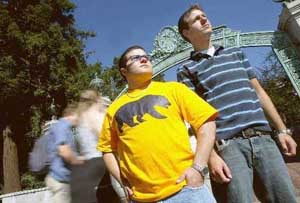-
- Louisiana voters approve same-sex marriage amendment
- GLBT students find it easier to compete for college scholarships
- San Francisco appeals court: Transgender woman can apply again for asylum
- GLBT youth issues explored at national forum
- Sex change patients able to obtain new birth certificates
- Farmer who protested Pride parade found guilty of harassment
- National News Briefs
- World News Briefs
national
GLBT students find it easier to compete for college scholarships
Increasing number of organizations, campuses offer GLBT student scholarships
Published Thursday, 23-Sep-2004 in issue 874
BERKELEY, Calif. (AP) – Aspiring civil rights lawyer Alyn Libman has something a lot of college students would covet: a $15,000-a-year scholarship to attend the University of California, Berkeley.
In the eyes of the private foundation paying his way, he was uniquely qualified, with a resume that showed not only athletic achievement and academic potential, but years of ridicule, getting attacked at knifepoint and Libman’s own precocious decision to become a boy in 11th grade.
“It felt amazing to actually be embraced by someone who didn’t just dismiss me for being different,” said Libman, 19, the first transsexual to win a scholarship from The Point Foundation, a San Francisco-based nonprofit that has awarded more than $1 million to college-bound gays and lesbians since 2002.
Coming out of the closet can bring anxiety or even danger to teenagers, who can be left in uncertain financial situations if their families reject them.
Now, for those seeking money to attend college, it no longer hurts to be gay, lesbian, bisexual or transgender. An increasing number of charities, professional groups and university campuses offer scholarships specifically for students whose sexuality doesn’t fit the coed mold.
More than 50 such scholarships are available nationwide – from the $1,000 scholarships that Zami, an advocacy group in Atlanta, is giving to 21 black lesbians and gays this year, the $2,000 awards the United Church of Christ distributed to gay seminarians, and the $3,000 fellowships George Washington University administers so gays and lesbians can spend a semester studying politics in the nation’s capital. Some groups, such as Parents, Families and Friends of Lesbians and Gays (PFLAG), also make financial aid available to children of gay parents or straight students who have worked to reduce homophobia in their communities.
“We want to be a beacon for some kid who is out there and feeling really lost and ashamed because society says they are nothing and nobody,” said Zami executive director Mary Anne Adams, who launched her group’s Audre Lorde scholarship program, named for the late lesbian poet, in 1997 with two $1,000 scholarships.
Sexual orientation alone usually is not enough to get this kind of money. Success against the odds, scholastic aptitude, extracurricular involvement and demonstrated leadership also are needed to qualify – the same qualities philanthropists have always sought to celebrate by endowing college scholarships.
But the essays these students write in their applications are something different – they tend to include tales of confusion and rejection. Many of the recipients are estranged from their families or have suffered through social lives that were tortured even by typical high school standards.
“The ability to take individuals who have had enormous disadvantage and to give them the ability to succeed in life is what’s important to society,” said Bruce Lindstrom, 59, who made a fortune as a membership warehouse executive, and founded The Point Foundation partly in response to being abandoned by his own family when he revealed he was gay in his mid-20s.
In targeting students who are both distinguished and disenfranchised, Lindstrom sees his program as a cross between the venerable United Negro College Fund and Oxford University’s prestigious Rhodes Scholarships. So far, the foundation has handed out multiyear scholarships covering tuition, housing and books to 27 undergraduate and graduate students.
“We try very hard to balance the issue of need versus the issue of leadership ability,” he said. “We are trying to identify those who have the capacity to make change in the world, to increase tolerance, and it’s a hard thing to balance those two things.”
Julie Schell, 30, a doctoral student at Columbia University’s prestigious Teacher’s College, represents the kind of student many gay alumni and gay employee associations were eager to assist when they established gay-specific tuition assistance programs.
Schell came out as a lesbian 10 years ago while she was an undergraduate at the University of Nevada-Reno. The disclosure alienated her from her family and college roommates. One day she went outside to find “Dyke” scrawled on her car.
Now in her second year as a Point Foundation scholar, Schell says the money has allowed her to continue her studies, but the emotional support is what enables her to succeed. The foundation pairs students with openly gay professional mentors. Schell’s is the president of Roosevelt University in Chicago.
Jeff Manassero, 19, started his freshman year at U.C. Berkeley armed with a $1,000 scholarship from PFLAG, and a $2,500 award from a gay employee group at Pacific Gas & Electric Co., California’s largest utility.
Unlike many of his peers, the Sacramento native has found continued acceptance from his family and friends since he came out in his junior year of high school. Yet even for him, having others salute his gay identity, as well as his 4.23 grade point average, has been empowering.
|
|
Copyright © 2003-2025 Uptown Publications


